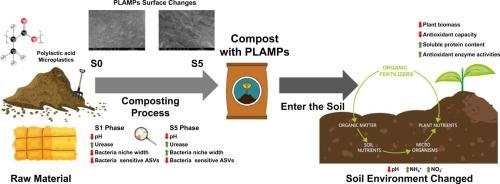当前位置:
X-MOL 学术
›
J. Hazard. Mater.
›
论文详情
Our official English website, www.x-mol.net, welcomes your
feedback! (Note: you will need to create a separate account there.)
The bifunctional impact of polylactic acid microplastics on composting processes and soil-plant systems: Dynamics of microbial communities and ecological niche competition
Journal of Hazardous Materials ( IF 12.2 ) Pub Date : 2024-09-06 , DOI: 10.1016/j.jhazmat.2024.135774 Yufan Wang 1 , Yiqiong Zhang 1 , Zhouchang Zhang 1 , Qing Liu 1 , Tengqi Xu 1 , Jiaxi Liu 1 , Siqi Han 1 , Tianjiao Song 1 , Li Li 2 , Xiaomin Wei 3 , Yanbing Lin 1
Journal of Hazardous Materials ( IF 12.2 ) Pub Date : 2024-09-06 , DOI: 10.1016/j.jhazmat.2024.135774 Yufan Wang 1 , Yiqiong Zhang 1 , Zhouchang Zhang 1 , Qing Liu 1 , Tengqi Xu 1 , Jiaxi Liu 1 , Siqi Han 1 , Tianjiao Song 1 , Li Li 2 , Xiaomin Wei 3 , Yanbing Lin 1
Affiliation

|
Although extensive research has been conducted on the environmental impact of microplastics (MPs), their effects on microorganisms during the composting process and on the compost-soil system remain unclear. Our research investigates the microbial response to polylactic acid microplastics (PLAMPs) during aerobic composting and examines how compost enriched with PLAMPs affects plants. Our findings reveal that PLAMPs play a dual role in the composting process, influencing microorganisms differently depending on the composting phase. PLAMPs reduce the relative abundance of sensitive bacterial ASVs, specifically those belonging to Limnochordaceae and Enterobacteriaceae , during composting, while increasing the relative abundance of ASVs belonging to Steroidobacteriaceae and Bacillaceae . The impact of PLAMPs on microbial community assembly and niche width was found to be phase-dependent. In the stabilization phase (S5), the presence of PLAMPs caused a shift in the core microbial network from bacterial dominance to fungal dominance, accompanied by heightened microbial antagonism. Additionally, these intricate microbial interactions can be transferred to the soil ecosystem. Our study indicates that composting, as a method of managing PLAMPs, is also influenced by PLAMPs. This influence is transferred to the soil through the use of compost, resulting in severe oxidative stress in plants. Our research is pivotal for devising future strategies for PLAMPs management and predicting the subsequent changes in compost quality and environmental equilibrium.
中文翻译:

聚乳酸微塑料对堆肥过程和土壤-植物系统的双功能影响:微生物群落动态和生态位竞争
尽管已经对微塑料 (MP) 的环境影响进行了广泛的研究,但它们在堆肥过程中对微生物和堆肥土壤系统的影响仍不清楚。我们的研究调查了微生物在好氧堆肥过程中对聚乳酸微塑料 (PLAMP) 的反应,并研究了富含 PLAMP 的堆肥如何影响植物。我们的研究结果表明,PLAMP 在堆肥过程中发挥着双重作用,根据堆肥阶段的不同,对微生物的影响不同。PLAMP 在堆肥过程中降低了敏感细菌 ASV 的相对丰度,特别是那些属于 Limnochordaceae 和 Enterobacteriaceae 的 ASV,同时增加了属于类固杆菌科和芽孢杆菌科的 ASV 的相对丰度。发现 PLAMPs 对微生物群落组装和生态位宽度的影响是相位依赖性的。在稳定期 (S5),PLAMPs 的存在导致核心微生物网络从细菌优势转变为真菌优势,并伴有微生物拮抗作用增强。此外,这些错综复杂的微生物相互作用可以转移到土壤生态系统中。我们的研究表明,堆肥作为管理 PLAMP 的一种方式,也受到 PLAMP 的影响。这种影响通过使用堆肥转移到土壤中,导致植物出现严重的氧化应激。我们的研究对于制定 PLAMPs 管理的未来策略和预测堆肥质量和环境平衡的后续变化至关重要。
更新日期:2024-09-06
中文翻译:

聚乳酸微塑料对堆肥过程和土壤-植物系统的双功能影响:微生物群落动态和生态位竞争
尽管已经对微塑料 (MP) 的环境影响进行了广泛的研究,但它们在堆肥过程中对微生物和堆肥土壤系统的影响仍不清楚。我们的研究调查了微生物在好氧堆肥过程中对聚乳酸微塑料 (PLAMP) 的反应,并研究了富含 PLAMP 的堆肥如何影响植物。我们的研究结果表明,PLAMP 在堆肥过程中发挥着双重作用,根据堆肥阶段的不同,对微生物的影响不同。PLAMP 在堆肥过程中降低了敏感细菌 ASV 的相对丰度,特别是那些属于 Limnochordaceae 和 Enterobacteriaceae 的 ASV,同时增加了属于类固杆菌科和芽孢杆菌科的 ASV 的相对丰度。发现 PLAMPs 对微生物群落组装和生态位宽度的影响是相位依赖性的。在稳定期 (S5),PLAMPs 的存在导致核心微生物网络从细菌优势转变为真菌优势,并伴有微生物拮抗作用增强。此外,这些错综复杂的微生物相互作用可以转移到土壤生态系统中。我们的研究表明,堆肥作为管理 PLAMP 的一种方式,也受到 PLAMP 的影响。这种影响通过使用堆肥转移到土壤中,导致植物出现严重的氧化应激。我们的研究对于制定 PLAMPs 管理的未来策略和预测堆肥质量和环境平衡的后续变化至关重要。































 京公网安备 11010802027423号
京公网安备 11010802027423号